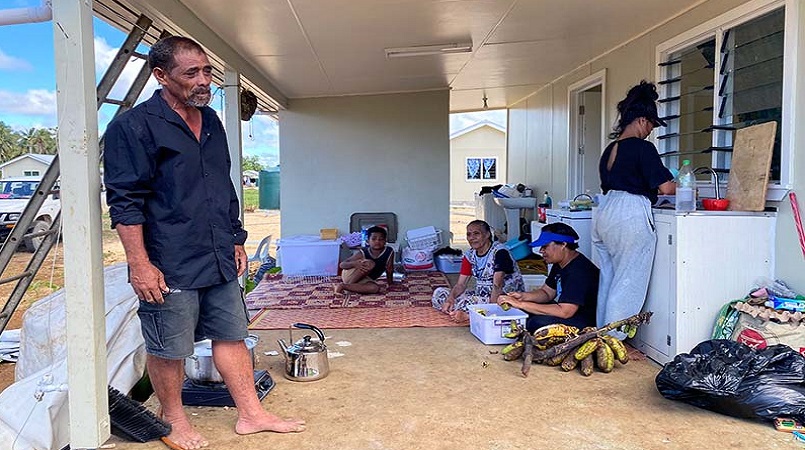
It’s been a year since the catastrophic eruption of the Hunga-Tonga Hunga-Ha’apai volcano in the Kingdom of Tonga.
The powerful undersea volcano erupted on January 15, 2022 triggering a violent tsunami which caused widespread damage to the main island of Tongatapu while wiping out smaller, neighbouring islands leaving them uninhabitable.
Tagata Pasifika reports Uatekini Folau and his family were forced to leave their home on ‘Atatā, one of the outer islands near the Hunga-Tonga Hunga-Ha’apai volcano.
“We lost our home and at the moment, even though we are starting over again, we are happy that my family and I are alive,” Uatekini says.
The explosion sent a plume of water, ash and sulphur over 58 kilometres into the air, covering much of the Island Kingdom in grey dust.
The eruption triggered a 20m high tsunami that surged over the neighbouring islands, wiping away everything in its path.
Separated from his family, Uatekini stayed back to rescue his elderly mother while his wife and others fled to higher ground.
“The powerful waves didn’t stop and I told my son to go save himself and just leave my mother and I. Thankfully my son encouraged me believing my mother will survive.”
The family made it to safety but sadly Folau’s mother passed away a few months after the ordeal. She’s now buried next to the family home on the main island Tongatapu.
As part of the government’s resettlement program, a new community on the western side of Tonga’s main island has been built called ‘Atatā si’i.
Now in a new home in the settlement, Uatekini says it’s a new beginning for the Folau family on Tongatapu. However, he is still haunted by the events of that fateful day.
“I started to feel that I wasn’t thinking right at times. I tried to make it go away,” he says.
Thankful to be alive and no longer homeless, other survivors are having to adjust to their new surroundings, including adapting to the cash economy on Tongatapu.
“At the moment, moving to Tonga(tapu), we learn what they do here. Which is to pay for everything. When we were on the island our food was fished from the ocean,” one woman says.
With no choice but to abandon their island all they have now are memories to hold on to.
“We don’t look back at what happened because it brings sad memories. Today we are free and happy,” says another man.
But not everyone has had a positive experience, a year on and Mele Lopeti is still displaced after having to flee from ‘Atatā.
“What we want is to be like the others and move to a house, a property where we can be reunited with our families,” Lopeti says.
More than 80 thousand people were affected by the disaster and when aid arrived from overseas, so did Covid-19 hindering reconstruction efforts in a country still grappling with the aftermath.
The Prime Minister, Hu’akavameiliku is hopeful the rebuild will be complete soon.
“A lot of the funds provided to us by development partners were put through to actually reconstruction, building small houses for the families that were affected,” he says.
“There were about, like, 700 homes that were affected in our general vicinity in Tongatapu and about 300 need to be rebuilt. We are about 80 percent there.”
The Ha’atafu beach resort on the picturesque West coast of Tongatapu used to welcome tourists from all over the world, but it has also disappeared with the tsunami waves.
Seti Chen, a representative of the Burling family who own the resort say they are finally rebuilding as they were initially a red zone.
“The ultimate goal is to build back the fales and bring the accommodations back but for now probably just one step at a time trying to establish the family home first hopefully with government support and try and keep the local staff rolling over as well in terms of securing their job security,” Chen says.
The devastation claimed four lives, leaving a damage bill of over 90 million US dollars. It’s a miracle many have managed to pull through one of the most violent explosions on earth in 140 years.
The explosion has been compared to other volcanic eruptions recorded around the world.
Tongan geologist Taniela Kula says the biggest so far was the Krakatoa eruption in Indonesia in 1883.
“What we have recorded for Hunga volcano is far bigger, four times bigger than the Krakatoa event,” Kula says.
And looking to the future, Tonga is among the most vulnerable countries in the world to natural disasters, say scientists who’ve discovered evidence of ongoing volcanic activity.
“Those submarine volcanoes in the south of Hunga, we need to do further assessment to study their volcanic eruption history to have a prediction of when is the likely, next cycle of eruption,” Kula says.
